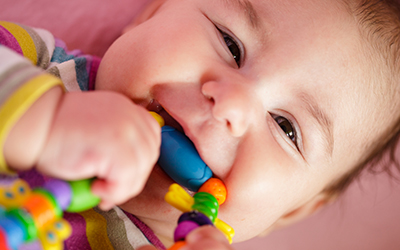Image Credit:
File ID 24198948 | © Oksix | Dreamstime.com

For most babies, teething begins around 6 months of age, though it can start as early as 4 months or as late as 12 months. The lower central incisors are usually the first teeth to appear, followed by the upper central incisors. By age three, most children will have a full set of 20 primary teeth. While teething is a natural part of development, it can cause discomfort and leave parents searching for safe ways to help.
Recognizing the signs of teething can help parents prepare and respond effectively. Symptoms may include:
It’s important to remember that teething itself should not cause fever, rash, or severe illness. If these occur, consult your pediatrician or pediatric dentist immediately.
Many parents worry when they notice their child’s first signs of tooth pain in Greensboro. Fortunately, several safe strategies can provide comfort:
If your child seems particularly uncomfortable, ask a dentist about safe options for tooth pain relief in Greensboro. Over-the-counter remedies should only be used under professional guidance.
Regular dental visits during the early years are essential. The American Academy of Pediatric Dentistry recommends that children see a dentist by their first birthday or within six months of the first tooth erupting. These visits allow providers to check for proper development and offer parents valuable guidance on oral care.
For families experiencing concerns about a persistent toothache in Greensboro, professional evaluation ensures that discomfort is related to teething rather than cavities or other dental conditions. Early exams also support habits that lead to lifelong healthy smiles.
While teething is temporary, it sets the stage for a lifetime of oral health. Parents can encourage healthy habits by:
These practices help prevent dental emergencies and support overall well-being.
Families seeking more information about pediatric dental care can visit the following helpful resources:
Both provide guidance on preventive care, treatment options, and what to expect when visiting Piedmont Pediatric Dentistry.